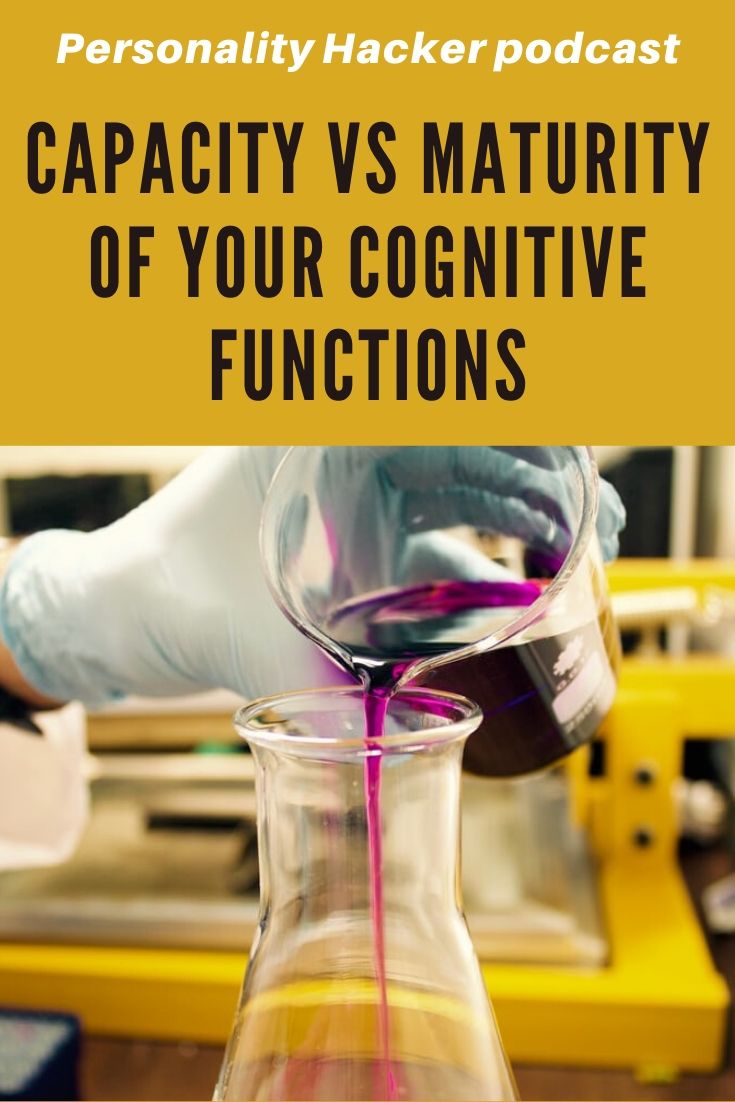Download Episode Here – right click link and select “Save Link As…”
In this episode, Joel and Antonia create a distinction between the capacity and maturity of your cognitive functions.
In this podcast you’ll find:
- Our framework, the car model, is a way to understand your cognitive function stack in terms of capacity and maturity.
- Dr Dario Nardi finds that as people grow, they can use their backseat functions with more maturity than those who have the same functions in the driver or co-pilot position.
- What do we mean when we talk about maturity versus capacity of our cognitive functions?
- Developing your backseat functions – why this is more about integration rather than working on them in isolation.
- Antonia shares some examples of what Si integration looks like.
- Things to keep in mind about our relationship with our 10 Year Old function.
- Antonia discusses integrating Fe as a 10 Year Old – and developing a mature relationship with it.
- Why do we tend to be overconfident with our dominant function, and lack modesty with our 10 year old?
- Our relationship with our Co-pilot – and why is this a good access point for growth.
- What does a healthy relationship look like with each of our functions, based on their position in our car?
- Viewing the car model as something in motion.
To subscribe to the podcast, please use the links below:
Subscribe with iTunes
Non-iTunes Link
Soundcloud
Stitcher
Google Play
Spotify
Radio Public
PlayerFM
Listen Notes
If you like the podcast and want to help us out in return, please leave an honest rating and review on iTunes by clicking here. It will help the show and its ranking in iTunes immensely! We would be eternally grateful!
Want to learn more?
Discover Your Personal Genius
We want to hear from you. Leave your comments below…


Share:
Podcast - Episode 0330 - The Binary Nature Of The 3-Yr-Old Inferior Cognitive Function
Podcast - Episode 0332 - Starting Your Own Business For Personal Growth - Part 1
11 comments
I had a bit of an aha moment listening to this, and it made me realize I don’t have a good grasp of the differences between Si and Te. As an INFP, I’ve heard a lot of advice that I should season my Fi with Te. If I want to bring my gifts of self-expression (Fi) to the world, I need to take actions in the outside world to make that happen (Te). But what I realized in listening to this podcast is that what I’ve accidentally been doing is attempting to rely on my Si to accomplish this.
For example, if I ever want to be a published author, well, I need to actually sit down and write. Thinking I was using Te, I came up with an elaborate productivity system that routinized my writing practice and regimented my days. Needless to say, within about a week my Fi and Ne were feeling totally suffocated by the routine and sameness of every day (and guys…this was not a super strict routine by many people’s standards, it was things like “must write for an hour at any point on this day”…this is considered regimented by INFP standards lol). The writing that is supposed to be my passion became torturous, it sucked the fun right out of it. I’m realizing now that routinizing things is actually much more the domain of Si. So what does seasoning Fi with Te look like exactly, if it doesn’t involve trying to set up some structures and routines to wrangle in that moody Fi that never quite “feels” like sitting down to write?
I did have an interesting thought about how I could use Si to support my Ne however, and that’s to reassure my Ne that committing to a class or seminar that I’m interested in does not need to be a panic-inducing loss of freedom—that committing to the routine of a class can actually feed my Ne rather than stifle it.
But I remain stumped on how to actually use Te to aid my Fi if not through routines…